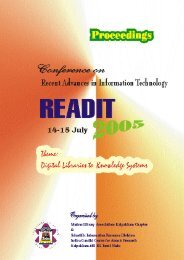READIT-2007 - Indira Gandhi Centre for Atomic Research
READIT-2007 - Indira Gandhi Centre for Atomic Research
READIT-2007 - Indira Gandhi Centre for Atomic Research
You also want an ePaper? Increase the reach of your titles
YUMPU automatically turns print PDFs into web optimized ePapers that Google loves.
in<strong>for</strong>mation and publishing it on the web is far from knowledge management. To<br />
provide high quality in<strong>for</strong>mation services to users, libraries need to describe the<br />
in<strong>for</strong>mation using metadata and organize them using classification schemes. Keyword<br />
based searching may not retrieve the content what user is looking <strong>for</strong>. For more<br />
effective and efficient search, the support of subject specific thesaurus can be used.<br />
To be successful in Knowledge Management, DL must become a knowledge space<br />
<strong>for</strong> a wide spread of knowledge enquiry, sharing and propagation.<br />
DL<br />
Knowledge Enquiry<br />
(Knowledge Base)<br />
Looking <strong>for</strong> Knowledge<br />
In<strong>for</strong>mation Browsing<br />
Intelligent In<strong>for</strong>mation<br />
In<strong>for</strong>mation<br />
DL Searching<br />
Fig.2 Knowledge Discovery<br />
In<strong>for</strong>mation Search is targeted towards a specific document by user request.<br />
In<strong>for</strong>mation browsing produces a conceptual map of set of documents. Knowledge<br />
discovery from the in<strong>for</strong>mation require intelligent answers to user queries with the<br />
support of set(s) of relevant documents. To <strong>for</strong>m a knowledge base, the classification<br />
and thesaurus are to be merged into a concept network and the metadata are<br />
distributed into nodes of concept network according to their subjects. This is not only<br />
the framework <strong>for</strong> knowledge organization but also a structure <strong>for</strong> knowledge<br />
Navigation retrieval and learning.<br />
6. USER MANAGEMENT<br />
Basically, in<strong>for</strong>mation services consist of three main points, and libraries<br />
should be able to (i) provide in<strong>for</strong>mation services to the patrons (ii) provide access to<br />
in<strong>for</strong>mation, and (iii) satisfy patrons' in<strong>for</strong>mation needs. Libraries should <strong>for</strong>m the<br />
amount of services and resources considering different patrons' needs. The whole<br />
variety of patrons' needs can be generally divided into three main groups.<br />
6.1 Access<br />
Libraries should provide open access to different kinds of in<strong>for</strong>mation in<br />
different <strong>for</strong>ms and on different media. In other words, a patron may need textbooks,<br />
reference works, dissertations, reviews, biographies, etc. in different languages and<br />
publication date. They may need a printed original or a digital copy, they may want to<br />
watch a screen version of a book or listen to some audio clips. A library must provide<br />
not only the resource itself, but an opportunity to read, watch, listen or study it.<br />
65

















